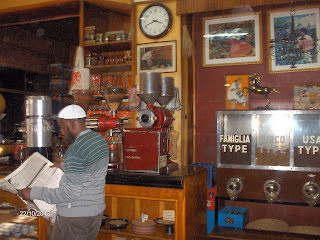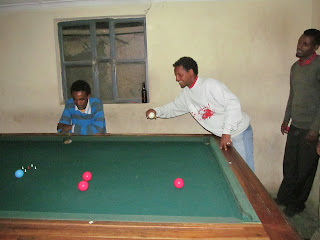I talked this tourist vendor down from 150 Birr (~$7.5 dollars) to 50 Birr (~$2.5) for a clay coffee pot. I think a local Ethiopian could have got it for about 30 Birr. Anyway, if it makes it intact back to Yakima I want to try to recreate the traditional coffee ceremony for people who are interested.
Northern Ethiopians play a game on a billiard table called "Karambula". It is like a cross between lawn bowling or bocce ball in that you throw one of the four balls with your hand, but like pool in that you have 6 pockets the ball could go and your are playing on a velvet covered piece of slate. But in this game you DO NOT want your ball to land in the pockets. Also there are 5 tiny pegs (seen to the left near the blue ball) that you are not allowed to hit.
During one of our guided hiking trips our guide brought us into a traditional Ethiopian. Here is the wood burning cooking stove with three different "burners". One on the left is for roasting things like barley, one on the right is for baking injera, the traditional thin pancake staple food made out of a grain called "teff". The one in the middle is for cooking in a regular pot.
Ethiopians love to get their shoes cleaned. Shoe cleaning and shining is everywhere. Cleaning cost 5 Birr (25 cents). They were not sure what to do with my boots, but they got a kick out of cleaning the faranjis' shoes. Faranji is amharic for "foreigner".
This is the view from our hotel in Adigrat. This was a refreshingly non-touristy town where people were so tickled to have foreigners staying in their town they forgot to inflate the prices for everything.
In Lalibela, our guide explains to us how this church carved into bedrock came about. All of these tourist attractions are used daily if not weekly by the local people in Lalibela. There is always a priest (center of picture) keeping an eye on things.
Before you enter any church, everyone must take off their shoes and leave them outside.
Scott looks out of a window from the priests room, also carved completely out of rock.
Gina enters one of many rock churches.
We caught this priest napping in one of the rock churches. He's probably been up since very early (like 4am) leading morning prayers.
Another rock church with similar awning. This one was not separated from the rock at the top, but there is excavation on all sides. The priests were just coming out of this church from a holy day Mass.
This "alley" through the rock is where the priests and monks live who take care of the churches. Their homes are caves carved into the rock.
As a respite from the hassle of alleged tour guides in the town of Lalibela, Scott and Gina took a hike up a nearby mountain. Little did they know that the little kids who lived on the mountain were learning how to be tour guides one day and were even more adamant that we buy one of their trinkets.
The markets in Ethiopia all sell unroasted coffee so that people can roast it themselves for personal coffee ceremonies in their homes. There are usually several grades to buy, usually visibly different because of the amount of "chaff" mixed in with the beans.
In Addis Abeba, we had a big hotel room with a balcony overlooking the city for $12 a night.
One of the reasons we stayed at the hotel that we did in Addis Abeba was for the adjacent jazz club. We saw two shows, the first of which had a band called "Addis Acoustic Project". The accordian that this guy was playing only came out for a few songs, but they even made THAT work in their repertoire.
On our last days near Addis, we went to a local resort called Sodore. The place was crawling with monkeys and actually smelled like a mixture of monkey poop and flowers all the time. Nonetheless, everyone seemed to love the monkeys, as evidence by this "shrine" attributed to them by the hotel management.



















No comments:
Post a Comment